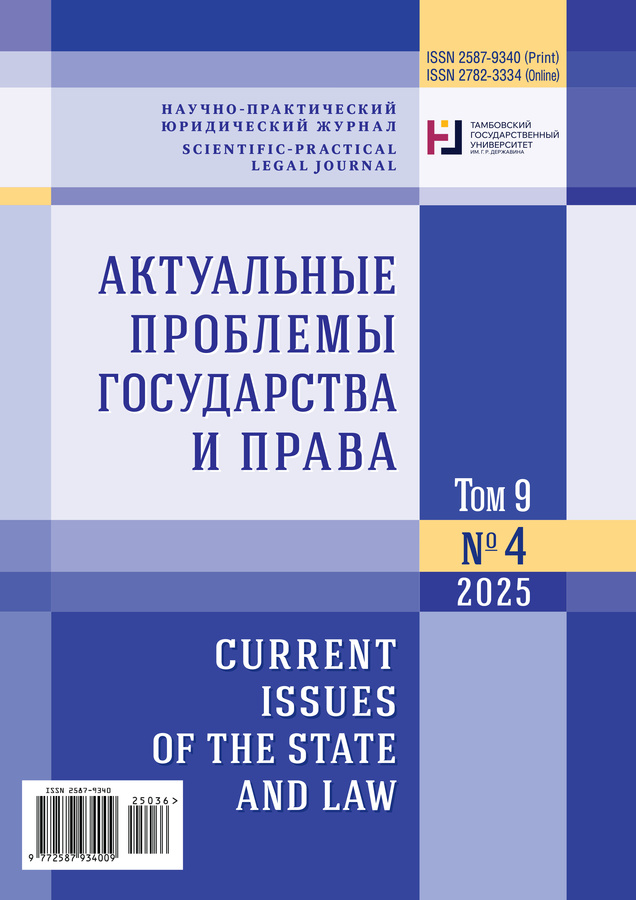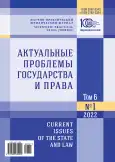Влияние цифровизации на сохранение ценных видов животных
- Авторы: ВЛАСОВА Е.Л.1, УСТЬЯНЦЕВА О.В.2
-
Учреждения:
- ФГБОУ ВО «Саратовский национальный исследовательский государственный университет им. Н.Г. Чернышевского»
- ФГБОУ ВО «Тюменский государственный университет»
- Выпуск: Том 6, № 1 (2022)
- Страницы: 19-26
- Раздел: Общая теория и история права и государства
- URL: https://journal-vniispk.ru/2587-9340/article/view/303692
- ID: 303692
Цитировать
Аннотация
Актуальность темы исследования обусловлена усилением процесса внедрения цифровых технологий в жизнедеятельность общества. Цифровая трансформация экологической сферы влияет на состояние окружающей среды и обостряет вопросы защиты среды обитания человека, сохранения биологического разнообразия. Выбор тематики объясняется тем, что отдельные представители дикой фауны являются экономически ценными ресурсами условно бесплатной природы, это привлекает преступные сообщества к освоению цифровой среды и развитию нелегальных торговых сетей. Методология исследования наряду с общенаучными методами включает частнонаучные: с помощью статистического метода количественными показателями дополнен правовой анализ посягательств на диких животных с использованием сети Интернет; культурологический метод позволил выявить влияние информационной среды на правотворческую деятельность, препятствующую киберпреступности. В ходе изучения поставленной темы отдельное внимание было уделено торговле ценными дикими животными в цифровой среде и установлено, что торговля дикими животными представляет угрозу национальной безопасности, ведет к утрате биоразнообразия, усилению коррупции, совершенствованию технологий киберпреступности, способствует совершению других антиобщественных деяний и ухудшению общественного здоровья. Сформулированные предложения по совершенствованию национального законодательства в части оборота ценных диких животных направлены на сохранение биоразнообразия.
Об авторах
Елена Леонидовна ВЛАСОВА
ФГБОУ ВО «Саратовский национальный исследовательский государственный университет им. Н.Г. Чернышевского»
Автор, ответственный за переписку.
Email: elenavlasova777@rambler.ru
ORCID iD: 0000-0003-1998-425X
кандидат химических наук, доцент кафедры таможенного, административного и финансового права
Россия, Российская Федерация, 410012 г. Саратов, ул. Астраханская, 83Ольга Владимировна УСТЬЯНЦЕВА
ФГБОУ ВО «Тюменский государственный университет»
Email: ovust@mail.ru
ORCID iD: 0000-0002-1624-0370
кандидат юридических наук, доцент кафедры гражданско-правовых дисциплин
Россия, Российская Федерация, 625003 г. Тюмень, ул. Володарского, 6Список литературы
- Грачев В.А. Экология, цифровизация и атомная энергетика // Энергия: экономика, техника, экология. 2020. № 6. С. 35-43. doi: 10.7868/S0233361920060051
- Серов Г.П. Экологический аудит. Концептуальные и организационно-правовые основы. М.: Экзамен, 2000. 768 с.
- Платонов Ю.Н. Экологическая сфера и ее международно-правовой статус // Журнал российского права. 2010. № 3 (159). С. 116-124.
- Жаворонкова Н.Г., Шпаковский Ю.Г. Экологические и энергетические проблемы четвертой промышлен-ной революции: правовые аспекты // Lex Russica. 2019. № 10. С. 53-62. doi: 10.17803/1729-5920.2019.155.10.053-062
- Шуйский В.П. Цифровизация экономики России: достижения и перспективы // Вестник Института эко-номики Российской академии наук. 2020. № 6. С. 158-169.
- Wang H., Shao J., Luo X., Chuai Z., Xu S., Geng M., Gao Z. Wildlife consumption ban is insufficient // Science. 2020, Mar 27. Vol. 367. Issue 6485. P. 1435. doi: 10.1126/science.abb6463
- Власова Е.Л., Устьянцева О.В. Проблемы реализации права на использование морских биоресурсов ко-ренными народами Российского Севера // Известия Саратовского университета. Новая серия. Серия: Экономика. Управление. Право. 2021. Т. 21. № 1. С. 92-99. doi: 10.18500/1994-2540-2021-21-1-92-99
- Duflot R., Baumeister S., Burgas D. et al. Building up an ecologically sustainable and socially desirable post-COVID-19 future // Sustainability Science. 2021. № 16. P. 1397-1403. doi: 10.1007/s11625-021-00940-z
- Morcatty Thais Q., Feddema Kim, Nekaris K.A.I., Nijman Vincent. Online trade in wildlife and the lack of re-sponse to COVID-19 // Environmental Research. 2021. Vol. 193. doi: 10.1016/j.envres.2020.110439
- Никифоров В.В. Конфликты между человеком и белым медведем в Российской Арктике. Практика борьбы с нелегальной добычей белого медведя в 2000–2020 годах // Белый медведь в природе и в неволе. Со-держание и сохранение вида: Материалы курса. М.: Государственное автономное учреждение города Москвы «Московский государственный зоологический парк», 2021. С. 178-184.
- Жевлаков Э.Н. О предмете незаконной охоты // Судья. 2016. № 4. С. 31-33.
- Парамонов А.В., Харин В.В. Некоторые аспекты обеспечения национальной безопасности в информаци-онной сфере // Актуальные проблемы государства и права. 2021. Т. 5. № 17. С. 161-170. doi: 10.20310/2587-9340-2021-5-17-161-170
Дополнительные файлы









